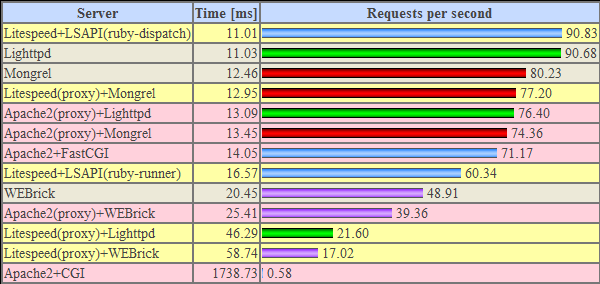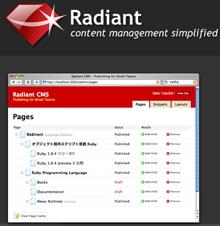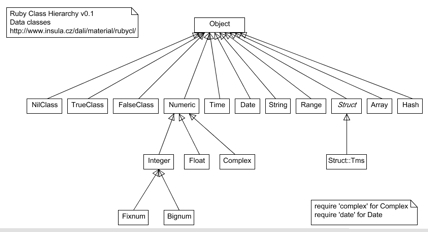The Charming Ruby Compiler is charming not just by name, but by nature. It’s a thesis project at the Computer Science Department at Chalmers University of Technology in Sweden to develop a proof of concept Ruby compiler that compiles to the C– intermediate language. So far, they’ve only got the basics working, but it’s an interesting project, if only to learn about C–, an interesting ‘portable assembly language’ that makes life easier for compiler developers. It seems a little like Parrot, and is funded by Microsoft Research and the National Science Foundation. Read More
Rather than use the send_file or send_data methods to send an entire, completed bulk of information back to the client, David N. Welton wanted to, effectively, print stuff to the client bit by bit. He worked out how to do it and presents his findings and sample code here.
A preview of his ‘output data to CSV line by line’ method: Read More
def generate_file
@headers["Content-Type"] = "text/comma-separated-values;"
@headers["Content-Disposition"] = "filename=\"some.file.txt\";"
i = 0
render :text => Proc.new { |response, output|
…
output.write("some generated text…")
…
}, :layout => false
end
Chris Anderson looks at deploying Rails apps with Capistrano and Mongrel on Planet Argon. He provides a whole pile of recipe snippets, as well as some Capistrano recipes for Mongrel ‘spinner’ and ‘restart’ tasks.
If all of this sounds like double dutch, you might want to skip this post, or learn more about Capistrano and Mongrel, as they’re both very useful tools when it comes to Ruby on Rails. Read More
I’m not a Windows user at all, but RForward struck me as perhaps being very interesting to those wanting to roll out Rails apps on Windows servers. It sounds like some of the new UNIX-side solutions to deploying Rails applications.. that is, proxying requests from one daemon to another rather than doing it all from one.
RForward is a reverse proxy designed to make Ruby on Rails applications easy to install into Microsoft’s IIS web-server.
The traditional way of installing Ruby on Rails applications into IIS is to use FastCGI. I have written a tutorial – as you can see it is quite long-winded and error-prone. Read More
maiha from #caboose ran some benchmarks and produced this graph of ‘requests per second’ for a basic app under different dispatcher setups (Apache, lighttpd, Mongrel, etc.):

It shouldn’t be taken as definitive (the Litespeed + lighttpd time seems suspicious to me), but it definitely demonstrates the power of lighttpd and Mongrel. Read More
Lately I’ve been finding little known Ruby gems and trying them out. My latest find is EventMachine. EventMachine describes itself:
Ruby/EventMachine is a fast, simple event-processing library for Ruby programs. It lets you write network clients and servers without handling sockets- all you do is send and receive data. Single-threaded socket engine- scalable and FAST!
Simply install with gem install eventmachine and you can create a fast, multi-user server / daemon like so:
require ‘rubygems’
require ‘eventmachine’
module EchoServer
def receive_data(data)
send_data “>>> You sent: #{data}”
close_connection if data =~ /quit|exit/i
end
end
EventMachine::run {
EventMachine::start_server “127.0.0.1″, 8081, EchoServer
}
Once you run this, you can telnet to localhost on port 8081 and have a conversation with yourself! Read More

Pastie is a new code pasting system developed by Josh Goebel. It has a 37signals type quality to it. It’s clean, quick, and does just what it says it’ll do. It colors your code and is just generally slick, pretty, and a fine piece of work. Josh also claims it’s less than 200 lines of Rails. Let’s hope the source gets released! Read More
Ryan Daigle reports that the latest ‘edge Rails’ has a cool new feature that lets you specify find conditions more logically. For example:
Post.find(:first, :conditions => ['status = ? and active = ?', 1, 1])
.. becomes:
Post.find(:first, :conditions => { :status => 1, :active => 1 })
I’ve accidentally tried to use this style before, and am glad it’s now an approved part of Rails. If you’re running edge Rails, you should have access to it as soon as you update, otherwise wait for Rails 1.2 :)
If this tickles your fancy, you might also want to check out ez_where by Ezra Zygmuntowicz that lets you do insanely cool stuff like:
articles = Article.ez_find(:all, :include => :author) do |article, author|
article.title =~ "%Foo Title%"
author.any do
name == ‘Ezra’
name == ‘Fab’
end
end
Yes, abstraction rules. Read More
It’s quick and easy (to do, not necessarily to parse!).
Step one: Install the FeedTools gem with gem install feedtools
Step two: Use the following code:
require ‘rubygems’
require_gem ‘feedtools’
feed = FeedTools::Feed.open(‘http://www.petercooper.co.uk/index.rdf’)
puts “Feed title is #{feed.title}”
feed.items.each do |item|
puts “#{item.title} – #{item.link}”
end
Step three: Learn more with the official tutorial and API documentation.
Step four: You are now the King of all feeds. Read More
From http://rails.co.za/articles/2006/06/03/using-railscron:
RailsCron, by Kyle Maxwell, ‘is a way to run background tasks using your Ruby on Rails environment.’ You could arguably do what ever you want to do in the background via running a crontab that executes the script/runner, but RailsCron enables you to do it all from ruby code, and seeing as it is an ActiveRecord object, you can manipulate it as such from your application.
Rails Cron isn’t the be-all and end-all of background task automation, but it can provide a useful crutch to lean on in some situations. If you need to send regular mails to users, etc, give it a look. Read More
Ruby Inline is an analog to Perl’s Inline::C. Out of the box, it allows you to embed C/++ external module code in your ruby script directly. By writing simple builder classes, you can teach how to cope with new languages (fortran, perl, whatever).
I downloaded it (simply download the gem and install it) and tapped out the following code, and it worked just great:
require ‘rubygems’
require_gem ‘RubyInline’
class << self
inline do |builder|
builder.c "
int dummy(int input) {
int i = 1;
while (input >= 1) { input–; i *= 2; }
return i;
}
"
end
end
puts dummy(8)
This works a treat on OS X. Read More

A lot of people have considered developing a content management system in Rails over the past year, but few attempts have turned into something usable. Enter Radiant CMS. It’s not finished yet, but it provides a good example of a Rails application and is available now via SVN. If digging through Rails source code is the way you learn best, enjoy! Read More
The forum set up for the Rails Recipes book has a section where readers can write their own Rails recipes. Some of them are pretty good and would have been good contenders for the book. Here are some of them:
- Create your own validates_abc_of validation – Show you how to create your own validation routines.
- Be notified when someone deploys your project’s code – Good for multiple developer situations.
- Using a legacy database – Getting Rails to respect database decisions made pre-Rails
- HTML Whitelists: The Easy Way
- Quick and Easy Textfilters
Pagination in Rails is good, but it can lack flexibility in many situations. At that point it’s time to roll your own. However, Phil Bogle and Laurel Fan came up with a solution they call paginate_by_sql that can solve some of the custom pagination problems. This needs to become a plugin.
I’m reposting their code here simply because I like to see syntax coloring :) Read More
# paginate by sql
# http://thebogles.com/blog/2006/06/paginate_by_sql-for-rails-a-more-general-approach/
# added support for sql with arguments
# added a :count option for passing in either a Integer count or count query.
module ActiveRecord
class Base
def self.find_by_sql_with_limit(sql, offset, limit)
sql = sanitize_sql(sql)
add_limit!(sql, {:limit => limit, :offset => offset})
find_by_sql(sql)
end
def self.count_by_sql_wrapping_select_query(sql)
sql = sanitize_sql(sql)
count_by_sql("select count(*) from (#{sql})")
end
end
end
class ApplicationController < ActionController::Base
def paginate_by_sql(model, sql, per_page, options={})
if options[:count]
if options[:count].is_a?

These are a few years old now, but they can still come in useful. Here are some useful graphs of Ruby’s class hierarchies for data types, IO, etc. Read More
